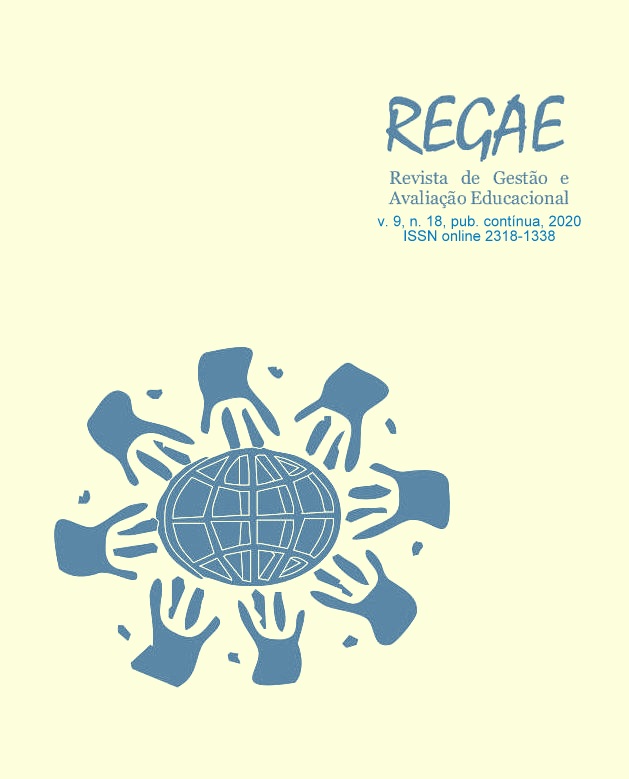The impact of national guidelines for the humanistic formation of the undergraduate course in Public Administration of UFRRJ
DOI:
https://doi.org/10.5902/2318133842328Keywords:
projeto pedagógico, administração pública, formação humanística, UFRRJAbstract
This text aims to discuss the results of the reformulation of the pedagogical project of the 2017 Undergraduate Course in Public Administration at the Federal Rural University of Rio de Janeiro - UFRRJ - in comparison with the 2010 pedagogical project and the criticisms contained about it in Baptista (2017). Methodologically, we analysed 38 subjects that make up students' training in credits contained in the PPCGAP, specifically, paying attention to the menus of 24 mandatory subjects regarding: general objective, specific objectives, menu, program content, bibliographical references. In the case of the new PPCGAP/2017 from UFRRJ, we can, in fact, situate a humanistic formation. In the basic training cycle, which runs from the first to the fourth period, almost 65% of the subjects address issues of social inequality, class, gender, race and sexuality. In the new PPCGAP / 2017 there is a clear and direct mention of the types of inequalities, violation of rights and the public manager's commitment to solving these and other problems. Finally, what we can see is that the new PPCGAP/2017 is guided in a humanistic, critical sense and situated in a democratic perspective in the context of combating social inequalities.
Key-words: pedagogical project, public administration, humanistic formation, UFRRJ.
Downloads
References
BAPTISTA, Vinicius Ferreira. Diretrizes nacionais e o descompasso na formação humanística do curso de graduação em Administração Pública da UFRRJ. Regae - Revista de Gestão e Avaliação Educacional, Santa Maria, v. 6, n. 13, 2017, p. 101-119.
BARROS, José D’Assunção. Igualdade e diferença: construções históricas e imaginárias em torno da desigualdade humana. Vozes: Petrópolis, 2016.
BENHABIB, Seyla. Dignity in adversity: human rights in troubled times. Cambridge: Polity, 2011.
BORILLO, Daniel. Homofobia: história e crítica de um preconceito. Belo Horizonte: Autêntica, 2015.
CARVALHO, José Murilo. Cidadania no Brasil: o longo caminho. Rio de Janeiro: Civilização Brasileira, 2013
DAVIS, Angela. Mulheres, raça e classe. Boitempo: São Paulo, 2016
FRASER, Nancy. Scales of justice: reimagining political space in a globalizing world. New York, United States: Columbia University Press, 2009.
GUIMARÃES, Antonio Sergio Alfredo. Racismo e antirracismo no Brasil. São Paulo: 34, 2009
HONNETH, Axel. Suffering from indeterminacy: an attempt at the reactualization of hegel's philosophy of right - two lectures. Assen: Van Gorcum, 2000.
HOOKS, Bell. Ensinando e transgredir: a educação como prática da liberdade. São Paulo: Martins Fontes, 2013.
HOULSTON, James. Cidadania insurgente: disjunções da democracia e da modernidade no Brasil. Companhia das Letras: São Paulo, 2013.
MARSHALL, Thomas Humprey. Cidadania, classe social e status. Rio de Janeiro: Zahar Editores, 1967
MATIAS-PEREIRA. Curso de administração pública: foco nas instituições e ações governamentais. São Paulo: Atlas, 2010
PIRES, Valdemir Aparecido; MIDLEJ, Suylan de Almeida Midlej; FONSECA, Sérgio Azevedo; VENDRAMINI, Patrícia; COELHO, Fernando de Souza|. Campo de políticas públicas no Brasil: definição, movimento constitutivo e desafios atuais. Administração Pública e Gestão Social, Rio Claro, v. 6, n. 3, 2014, p. 110-126.
RAWLS, John. Justice as Fairness: A restatement. Massachusetts: Harvard University Press, 2001.
UFRRJ. Projeto pedagógico do curso de Administração Pública de 2017. Seropédica: UFRRJ, 2017. Disponível em http://cursos.ufrrj.br/grad/admpublica/ppp-projeto-politico-pedagogico. Acesso em 30 jan. 2020.
UFRRJ. Projeto pedagógico do curso de Administração Pública de 2010. Seropédica: UFRRJ, 2010.
YOUNG, Iris Marion. Responsability for Justice. Oxford: Oxford University Press, 2011.
Downloads
Published
How to Cite
Issue
Section
License
Authors keep copyright and concede to the magazine the right of first publication, with the work simultaneously licensed under the Creative Commons Attribution 4.0 International, non-commercial license with no derivative work, which allows to share the work with no author recognition and initial publication in this magazine.
Authors has authorization to overtake additional contracts separately, to distribute a non-exclusive version of the work published in this magazine: For example: to publish in an institutional repository or as a chapter of a book, with authorial recognition and initial publication in this magazine.
Authors are allowed and are encouraged to publish and distribute their work online. For example: in institutional repositories or in their own personal page – at any point before or during the editorial process, because this can result in productive changes, as well as increase the impact and the mention to the published work.






